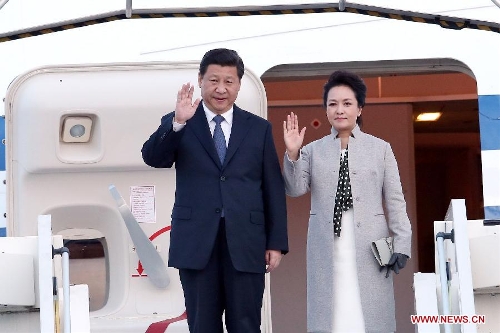Deals to ease France deficit

Chinese President Xi Jinping (L) and his wife Peng Liyuan arrive in Lyon for a state visit to France March 25, 2014. (Xinhua/Pang Xinglei)
China and France ought to expand their business cooperation from traditional high-tech to products that could meet the demand of China's growing middle class, so as to narrow the huge trade deficit in China's favor, said analysts, as Chinese President Xi Jinping is in France for a state visit.
Xi was expected to oversee the signing of a series of major business deals in Paris with his French counterpart Francois Hollande on Wednesday, the second day of his state visit.
Among the deals to be inked, one was set to allow Chinese carmaker Dongfeng to buy a 14 percent stake in struggling French auto giant PSA Peugeot Citroen. Peugeot and Dongfeng plan to extend an existing joint venture and production in China to enter new Southeast Asian markets and co-develop new vehicles and technologies, Reuters reported.
A deal is also expected to be signed for China to purchase at least 150 aircraft worth $20 billion from Airbus. The deal reportedly could include both planes and helicopters. Meanwhile, progress may also be announced in talks on opening a second Airbus factory in China.
Such big orders are not likely to change the huge trade deficit of France to China, Hu Ronghua, an associate professor with the School of Economics at Fudan University, told the Global Times.
Economic and trade ties between the two sides have seen a jump over the past decades, as bilateral trade hit $50 billion last year, compared with $100 million in 1964. But the trade relationship is marked by an imbalance and it is "unsustainable," French Foreign Minister Laurent Fabius said during his visit to China in late February.
There has been a trend of deficit increase between the two countries. In 2000, the trade deficit of France with China was 5.7 billion euros ($7.86 billion) and in 2013 it reached 26 billion euros, accounting for 40 percent of the country's deficit.
The huge trade deficit is caused mainly because of the different industrial structures of the two countries, the expert said.
Cooperation between China and France is mainly in traditional sectors such as aviation, astronautics and aeronautics, and nuclear energy, Ding Chun, director of the Center for European Studies at Fudan University in Shanghai, told the Global Times on Wednesday. He noted that France's faltering economy hasn't fully recovered from the euro crisis which is another reason for the deficit.
China's exports to France include textiles, apparel, family appliances and agricultural products, according to China's Ministry of Commerce.
"As a big manufacturer, China's exports to France are mainly products needed in people's daily lives which are in huge demand. Meanwhile, France's exports are high-tech ones, which led to limited demand and the trade deficit," Hu said.
In trade and investment ties with China, France lags behind other European countries, particularly Germany.
In 2013, China's imports from France accounted for only 1.2 percent of the total, while in Germany's case the figure stands at 4.8 percent, according to statistics from China's General Administration of Customs.
Hu said that as a leading European country in the manufacturing industry, a big part of Germany's exports to China are machinery products, which meet China's massive demand during its rapid development.
In order to narrow the deficit, the two sides can expand exchanges in the cultural industry including movies, arts, fashion and cuisine to meet the demands from China's growing middle class, Hu said.
France is eager to reshuffle trade and investment ties with China and is seeking to expand in new sectors including agriculture, urbanization development, medicine and health, Fabius said on his February visit to China.
Before heading to Paris, Xi on Wednesday visited Biomerieux research center in Lyon, the Xinhua News Agency reported. The Chinese leader said China and France have been undertaking frequent exchanges, and sharing broad prospect in boosting their cooperation in the health sector.
Bilateral trade can be rebalanced "by developing our cooperation in various sectors, by allowing more Chinese investments to flow into France and following successful projects such as … Dongfeng in PSA Peugeot Citroen," French Ambassador to China Sylvie Bermann told the Global Times earlier this month.
In this process France has to remove limitations for Chinese enterprises and provide more preferential policies to create a favorable environment for Chinese investors, Hu said.
Meanwhile, China can consider further opening up its market to French companies and carry out some promotion for France, she added.
So far there has been no investment agreement reached between the two sides.
"Enhanced economic cooperation between China and France can push forward China's industrial upgrade and help boost the Chinese economy as it is slowing down," Zhang Shengjun, an international politics professor with Beijing Normal University, told the Global Times.
Daily Special: President Xi Jinping visits Europe, attends nuclear summit